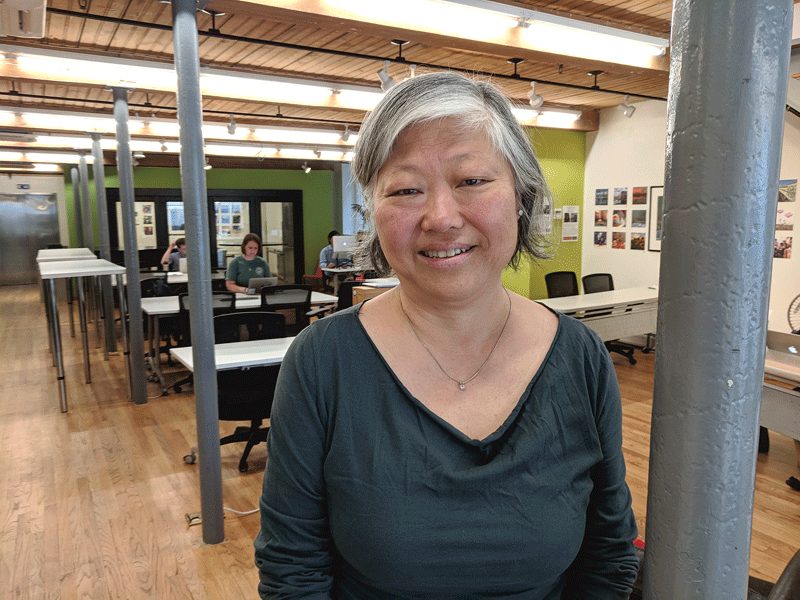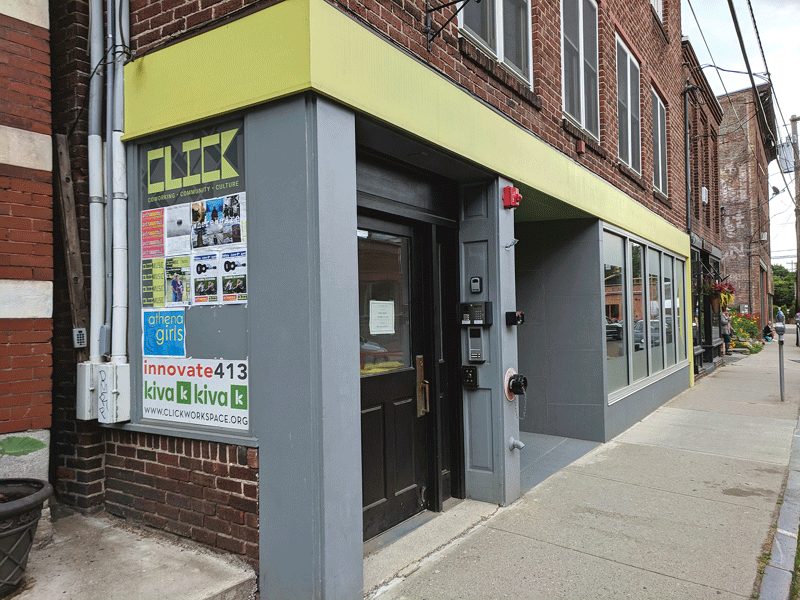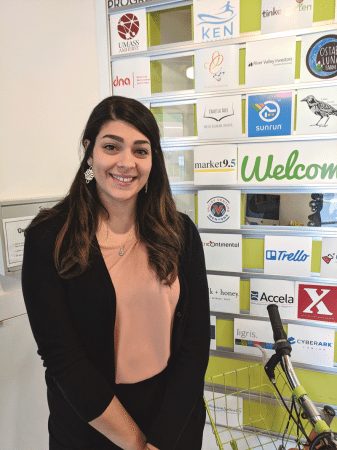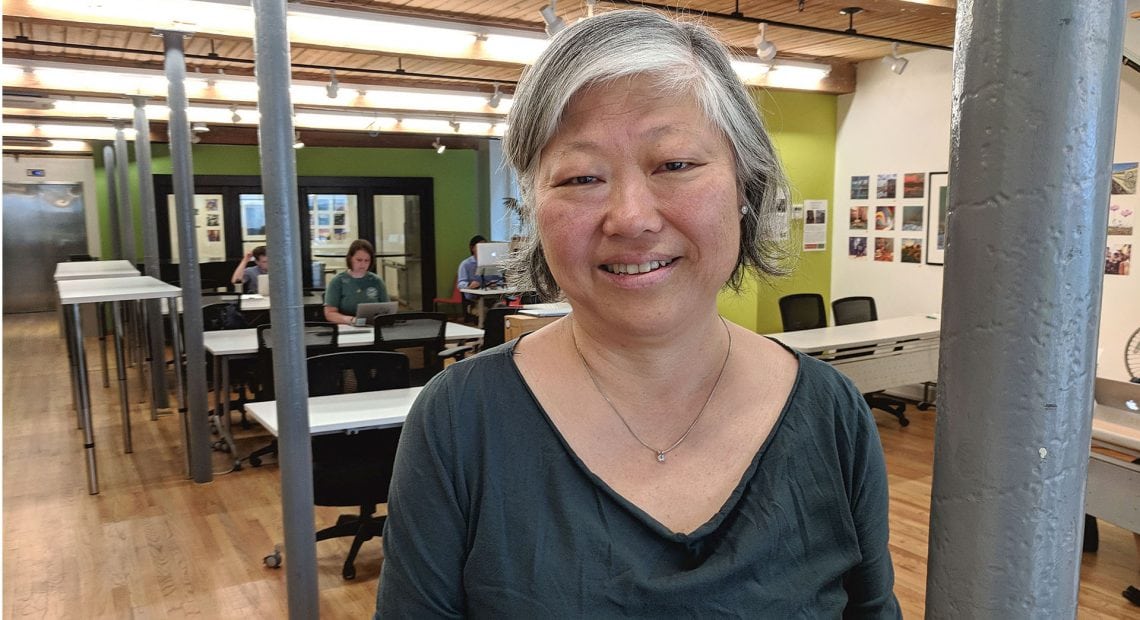Art and Commerce

Mary Yun on the ground floor of Click Workspace’s Market Street location.
Co-working spaces — offices where members share physical work areas and office technology and supplies — have become an increasingly popular model for small, particularly solo, businesses in the region. Mary Yun, executive director of Click Workspace in Northampton, had a broader vision, helping to grow a center that brings economic energy to the city, but also builds on its cultural vibrancy through the arts. A rapidly growing roster of members testifies to the success of that vision.
Mary Yun remembers the days when fax machines were considered modern technology, and so much that has happened since — from e-mail to social media to 24-hour, mobile access to limitless information — has only served to make it easier for people to work pretty much anywhere.
“Remember telecommuting? Everyone was like, ‘that’s amazing; I can work in my pajamas.’ Everyone thought it was great,” said Yun, executive director of Click Workspace in Northampton. “But the further and further technologically advanced we get, the less human contact we have.
“That’s why co-working spaces have become so popular, because people need that,” she went on. “The more technologically advanced we get, the more we need spaces like this for people to physically gather, whether it’s for work or for other reasons.”
Yung has been a key figure in the dramatic expansion of Click, which launched in a 1,000-square-foot facility behind Sylvester’s restaurant back in 2011. An architect by trade, she created Market9.5, LLC in 2012 so she could purchase and develop a 9,000-square-foot building at 9 1/2 Market St., which Click has called home for the past two years.
Remember telecommuting? Everyone was like, ‘that’s amazing; I can work in my pajamas.’ Everyone thought it was great. But the further and further technologically advanced we get, the less human contact we have.”
“We have such a wide range of professionals here, from people who are sole proprietors, like myself, to people who work as consultants to firms in other parts of the United States and the world,” she added, referring to Click’s 98 members, soon to be 100 with two pending additions. “Then we have people of all different age groups. Right now, we have a huge amount of members with small children.”
Those tend to disperse around 4 p.m. each day, she noted, while others may work well into the night; Click is a 24-hour operation.
But why bother being a member at all, with modern communication turning any home into an office? There are a few reasons, said Sofia Nardi, Click’s member advocate.
“A lot of people don’t find themselves productive at home,” she told BusinessWest. “They see laundry, start to do laundry, and stop working. Or their TV is there. A lot of people feel that a shared space is more conducive to working. When you see other people working, you get to work.

Click has become not just a home to small businesses, but a cultural force through its promotion of the arts.
“The second reason,” she went on, “is that a lot of remote workers are looking for a community and looking for co-workers to talk to during the day, even if they don’t interact with them on a daily basis.”
The basic concept behind co-working is simple. It’s a workspace where people can share a table or an office; access fast Internet service and shared resources like a copier, conference rooms, and audio-visual equipment; and make the kinds of connections that inspire further growth and success.
Yun had a broader vision, however, when she came on board — one centered around the arts as an economic driver.
“When Click was founded, it was mostly geared toward entrepreneurs. I knew a couple of the founding members, and they came to me and said, ‘help us grow.’ And this building was on the market, so I said, ‘this is a perfect location. We want to stay downtown,’” she recalled.
“I also said, ‘I want to rebrand Click. I want to open it up not just for entrepreneurship but for all kinds of professionals, a broader group of users. But the bigger thing is that the rebranding involved the ability to do cultural events and welcome the community in.”
That has proved to be a critical factor in Click’s growth, simply by using the arts — gallery shows, music performances, literary events, and the like — to emphasize Northampton’s cultural heritage while exposing new faces to Click’s eclectic space.
For this issue’s focus on the creative economy, BusinessWest visits one of the Valley’s many burgeoning co-working centers to explore why it has grown so quickly in recent years, and why the shared-workspace model is so appealing to the area’s business people who plant roots there.
Out of the Ghetto
Click’s co-founders — Ali Usman, Lisa Papademetriou, and Rocco Falcone — drew inspiration from much larger projects such as the Cambridge Innovation Center and the Innovation Pavilion in Colorado, which Usman also founded. Their original space included a main room with several tables and three small offices, and growth was definitely limited.
That led to some healthy connections between members, Yun said; in fact, they couldn’t be avoided.
“That happened very easily because it was packed,” she said. “It was like a ghetto; everyone was forced to interact. We had people packed in, four to a table, working away, and you knew everyone’s business.”
Looking across Click’s main room during BusinessWest’s visit, as about a dozen members quietly worked, heads in their laptops, she noted that density has certainly decreased, which has its pros and cons.
“When we moved here two years ago, all of a sudden it was like living in the suburbs. Like, you know who lives in that house, but you don’t have to deal with them,” she said by way of analogy. “As we start our third year in this space. I’m hoping we grow in density in the open office space so that we’re an urban community — but not a ghetto. And with our open office-space membership growing, we’ll see more of that happening. The analogy of urbanism is really the best thing to describe what we’re going through as we grow into this space.”
In designing the four-story facility — with its blend of shared workspaces, private offices, and shared offices, with membership options starting at $195 per month and rising from there, depending on how much space and privacy is desired — Yun said it was important to create a place where people would want to gather, and she feels the former antique store on Market Street accomplishes that goal.
“It’s very comfortable, very intimate. We’ve tried to keep the charm of this building, which was built in the ’20s as a warehouse facility. Since then, it’s gone through various changes,” she said, pointing out the glass-walled offices designed to take advantage of the natural light from Click’s storefront.

Sofia Nardi stands in front of the wall of company logos greeting visitors at Click’s entrance.
Nardi explained that the building is locked to outsiders, and members can give visitors a guest code to get in. Several conference rooms of different sizes are available to members for three hours at a time (longer for a small fee), and everyone has access to the shared office equipment, the basement kitchen and lounge, a shower for those who bike to work or visit a gym on the way in, and even a small room with greenscreen paint on the walls for video production.
Meanwhile, members access perks like reduced-rate gym memberships, hotel stays, and airport parking, to name a few, through area partnerships Click has forged, and member events throughout the month range from ‘Chew,’ a community lunch, to weekly yoga sessions to monthly happy hours, explained Nardi, whose roles at Click since coming on board in January include managing administrative functions, accounting, office operations, purchasing, and troubleshooting routine problems with equipment and maintenance, as well as serving as the first point of contact for all inquiries and visitors.
Art of the Matter
But what really has Yun and Nardi excited is the range of activities aimed at bringing in visitors. The space can be rented out for recitals, team-building exercises, and corporate parties, and Click maintains a steady flow of art displays through Arts Night Out events as well as music performances, with much of the ticket and art sales directly benefiting the artist.
“The first floor doubles as event space,” Nardi said. “It’s about getting people into this space and experiencing art and culture in Northampton.”
Yun said the space was designed specifically to facilitate such events.
“When we do art openings for Arts Night Out, we’ll have a guy come in to play the piano, and people walk in, and they’re surprised. It’s something you don’t necessarily expect.”
In addition, she noted, “because we have the rotating art, members that normally would not look at art are looking at art. That was one of my personal missions: trying to get more integration of culture, arts, and music into everyday life for everybody. Because it’s really disappearing.”
She explained that, when she moved to Northampton about 18 years ago, there were more small, “pocket” venues where people gathered to listen to live music. “Now it’s gotten a little more gentrified in Northampton, and those little spaces have kind of disappeared. So, having seen the evolution of that, it’s like, ‘oh my God, I don’t want Northampton to become just another New England tourist town.’”
Avoiding that fate, she said, requires a combination of professionals working downtown, not on the city’s fringes, and creating more vibrancy after hours through cultural events.
“People need that human interaction,” Yun said. “When people come for events, the first time they’re here, they’re like, ‘wow, this is amazing,’ and they might not even see it as a co-working space, since we move all this furniture out.” But when they do realize what the building has to offer an entrepreneur or creative professional, they may return during the day, asking about membership.
“I think what sets us apart from some of the other co-working spaces is that we really do have a mission to become embedded in this community,” she said, noting that renting out the conference rooms to area organizations is another way of bringing people inside. When they do, she noted, they’re immediately met by a wall of names and logos of member businesses, prominently displayed at the entrance.
“That’s the first thing they see because that’s what it’s all about. It’s a great physical space, but it’s really about the community of memberships we have,” Yun said. “If you want to keep Northampton downtown viable for anything, so that it just doesn’t become just another tourist town, you have to keep businesses here. There are towns like Northampton around, but it’s a challenge.
Part of the Whole
Click is a nonprofit organization, Yun said, but more importantly, it’s a collective and a place where professionals can collaborate — or, echoing Nardi’s observation, just hunker down in a place more conducive to working than beside the TV or a load of dirty laundry.
“If you have a membership here, you’re part of this whole community of Click, and you share all the resources. It’s totally convenient,” Yun said. “Plus, you can open a business and put all your energy into growing the business and not have to worry about the facilities. When you’re starting out, who can afford to have all the equipment, all those startup costs?”
Click has made forays into presenting professional-development events, but Yun admitted it’s more difficult these days to draw attendees, since so much information about … well, everything, really, is readily available online. “The best thing that happens here professional-development-wise is members making connections.”
Two years into the new space, Yun is glad she took on the challenge of converting an old building downtown into a bright, modern space — complete with fiber-optic service, a totally new HVAC system, and other amenities — that today’s professionals, whether remote workers, sole proprietors, or road warriors in need of a home base, can feel comfortable working in.
There’s a reason, she said, that co-working spaces — from Colab Design in Easthampton to the Writer’s Mill in Florence; from AmherstWorks to CoWork Springfield — have been popping up across the region, and succeeding. To many, that model simply makes more sense than working alone.
“We don’t compete with them,” Yun told BusinessWest. “We just make ours the best we can.”
Joseph Bednar can be reached at [email protected]





